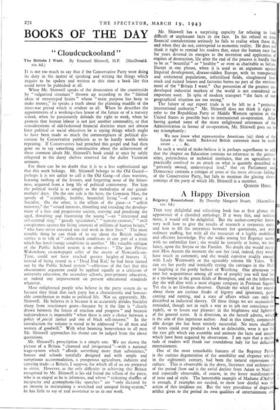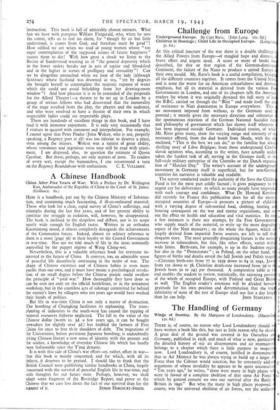A Happy Diversion
THIS very delightful and refreshing book has at first glance the appearance of a classified anthology. If it were this, and nothing more, it would still be delightful. But the author-compiler knows very well how to give the results of research a corporate unity, and how to fill the interstices between her quotations, not with ordinary stuffing, but with all the resources of a highly .mobilised and effective knowledge. For she walks among her Regency seen with no unfamiliar foot ; she would be instantly at home, we may fancy, upon the Steyne or the Pantiles. No doubt she would recog- nise Miss Austen the moment she saw her (and, indeed, they would have much in common), and she would converse readily enough with Lady Wentworth or the agreeably solemn Mr Yates. We can see her pertly and•ironically eyeing the carriages in the Mall, or laughing at the portly bathers of Worthing. One afternoon (so easy her acquaintance among all sorts of people) you will find her at a tea-house in the green fields of Brompton, and on the following day she will dine with a most elegant company in Portman Square. Yet she is no frivolous observer. Outside the whirl of her round- about there are curious freaks of bigotry and ignorance, queer canting and ranting, and a state of affairs which can only be described as industrial slavery. Of these things we are occasionally reminded, though not in such a way as to jolt our conscience too rudely, or to lessen our pleasure in the brightness and lightness of the general scene. It is diversion, as she herself admits, whit is the aim of this ingenious author, And in this timely, commend able design she has been entirely successful. No mere shuffiin of notes could ever produce a book so delectable, were it not for the rare gift which can assemble and animate the facts and images which have been acquired by observation. I am sure that a multi- tude of readers will thank our roundabout lady for her delicious entertainment.
One of the most remarkable features of the Regency Peri is the curious degeneration of the sensibility and elegance which in the eighteenth century, had been the natural expressions culture. This is observable in the dress, literature and architectur of the period (how sad is the awful decline from Adam to Nash r and especially observable, of course, in the lesser manifestation of taste and of style. The lamentable example of Madame d'Arbla is enough, if examples are needed, to show how direful was th action of this insidious rot. But the very prevalence of degrad artifice gives to the period its own qualities of entertainment a
instruction. This book is full of admirably chosen extracts. What fun we have with pompous William Fitzgerald, who, when he sees the comet, tells us to feel no alarm, for "though by us but little understood, it comes from God, and therefore must be good "! How edified we are when we read of young women whose " too eager contemplation of the supposed scenes of future happiness " causes them to die! With how great a shock we listen to the Rector of Sanderstead warning us of "the general depravity which in the lower orders breaks out in acts of rapine and bloodshed and in the higher in scenes of profligacy and sensuality "! Can we be altogether untouched when we hear of the lady (although fictitious) whose husband was drowned at sea, "yet by degrees she brought herself to contemplate the majestic expanse of water which she could not avoid beholding from her drawing-room window "? And how pleasant it is to be reminded of the proposals for the Alfred Theatre !—a theatre to be set up in London by a group of serious fellows who had discovered that the immorality of the stage resulted from the play, the players and the audience, and who were resolved to have a theatre of their own in which respectable ladies could see respectable plays.
There are hundreds of excellent things in this book, and I have read it with immense enjoyment. It is only very occasionally that I venture to quarrel with comment and interpolation. For example, I cannot agree that Peter Pindar (John Wolcot, who is not, properly speaking, a Regency poet at all) was too inferior to deserve a place, even among the minors. Wolcot was a satirist of great ability, whose venomous and ingenious verse may still be read with enjoy- ment. I am disposed, also, to question the estimate of Queen Caroline. But these, perhaps, are only matters of taste. To readers of every sort, except the humourless, I can recommend a turn
on the Regency Roundabout with enthusiasm. C. E. VULLI/0%Y.



























 Previous page
Previous page